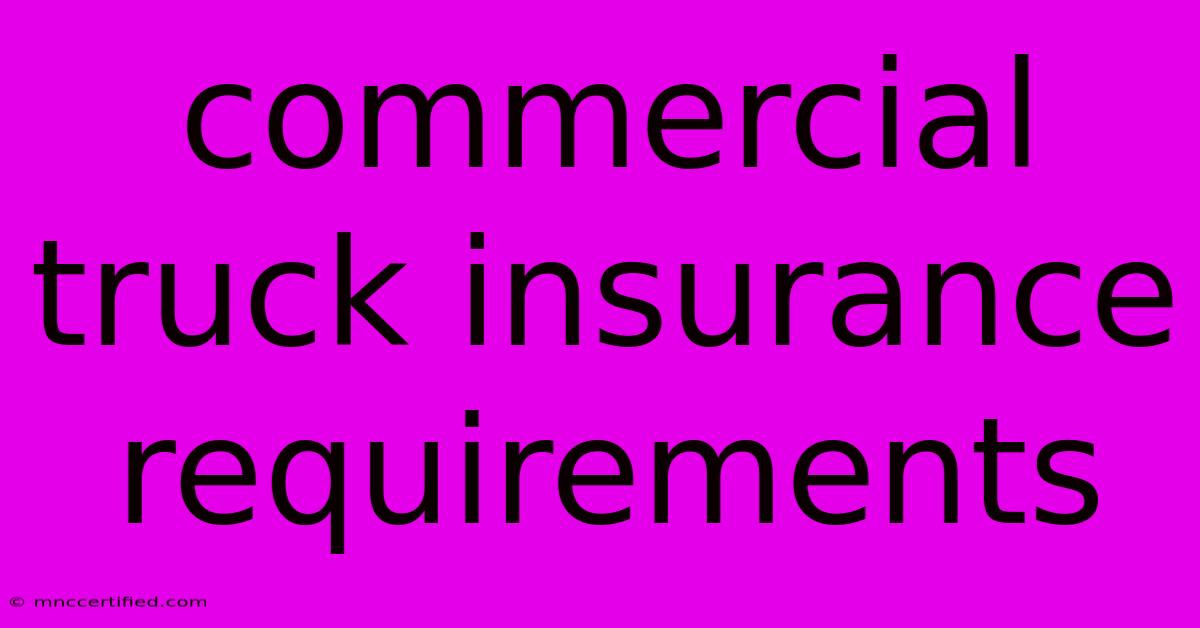Commercial Truck Insurance Requirements

Table of Contents
Navigating the Road: Essential Commercial Truck Insurance Requirements
Owning and operating a commercial truck is a significant undertaking, and ensuring proper insurance coverage is paramount. From protecting your assets to safeguarding your business, understanding the commercial truck insurance requirements is crucial.
This comprehensive guide will delve into the essential types of coverage, state regulations, and factors influencing your insurance premiums.
Understanding the Basics: What is Commercial Truck Insurance?
Commercial truck insurance is specifically designed to address the unique risks associated with operating a truck for business purposes. Unlike personal vehicle insurance, it covers a wider range of potential liabilities and losses, catering to the diverse needs of trucking companies and owner-operators.
Key Types of Coverage: Protecting Your Business and Assets
1. Liability Insurance:
This is the most fundamental coverage, offering protection against financial losses if your truck is involved in an accident causing bodily injury or property damage to others. It covers:
- Bodily Injury Liability: Pays for medical expenses, lost wages, and other damages sustained by injured parties in an accident.
- Property Damage Liability: Covers damage to another person's property, including vehicles, buildings, and other assets.
2. Cargo Insurance:
Crucial for businesses transporting goods, cargo insurance protects against loss or damage to the cargo during transit. It covers:
- Physical Damage: Protects against loss or damage to goods due to accidents, theft, fire, or other perils.
- Liability: Covers financial losses to the cargo owner if damage occurs due to negligence.
3. Physical Damage Coverage:
This insurance protects your truck itself against physical damage, offering financial assistance for repairs or replacement after an accident or other incidents, such as:
- Collision Coverage: Covers damage to your truck from collisions with other vehicles or objects.
- Comprehensive Coverage: Protects against damage caused by events other than collisions, such as theft, vandalism, fire, or natural disasters.
4. Uninsured/Underinsured Motorist Coverage:
This protection is vital, offering financial support if you are involved in an accident with an uninsured or underinsured driver. It covers your own medical expenses and property damage.
5. Workers' Compensation Insurance:
If you employ drivers, workers' compensation insurance is mandatory in most states. It covers medical expenses and lost wages for employees injured on the job.
State Regulations: Complying with the Law
State regulations play a significant role in determining your commercial truck insurance requirements. Factors such as vehicle type, cargo weight, and the state of operation will influence the specific coverage you need.
Federal Regulations:
The Federal Motor Carrier Safety Administration (FMCSA) mandates certain insurance requirements for interstate commercial truck operators. These regulations specify minimum liability limits for various truck types and cargo weights.
State-Specific Requirements:
Beyond federal mandates, each state has its own unique set of requirements for commercial truck insurance. These can vary significantly, so it's crucial to research and comply with the regulations of all states where you operate.
Factors Affecting Premiums: Understanding Your Cost
Several factors can impact your commercial truck insurance premiums, including:
- Driving History: Clean driving records generally lead to lower premiums.
- Truck Age and Value: Newer and more expensive trucks often attract higher premiums.
- Type of Cargo: Hazardous materials or high-value cargo can increase premiums.
- Years of Experience: Experienced drivers often qualify for lower rates.
- Safety Programs: Implementing safety programs can demonstrate responsible operations and potentially lower your premiums.
Choosing the Right Coverage: Finding the Best Fit
Selecting the right commercial truck insurance policy requires a thorough understanding of your specific needs and risks. Consider factors such as:
- Frequency of Trips: Frequent travel may necessitate higher coverage limits.
- Cargo Value: Transporting high-value goods may require additional coverage.
- Safety Record: A good safety record can help lower premiums.
- Budget: Balancing coverage with affordability is essential.
Consult with a Trusted Broker:
Working with a reputable insurance broker specializing in commercial truck insurance can provide valuable insights. They can help you:
- Assess your risks: Identify specific coverage needs based on your business operations.
- Compare quotes: Find competitive rates from reputable insurance companies.
- Negotiate policies: Obtain the most favorable coverage and pricing options.
Protecting Your Business: Invest in Comprehensive Coverage
Investing in adequate commercial truck insurance is not just a legal requirement but a crucial step in protecting your business's financial stability. By understanding the types of coverage, state regulations, and factors influencing premiums, you can make informed decisions and secure the right protection for your operations.

Thank you for visiting our website wich cover about Commercial Truck Insurance Requirements. We hope the information provided has been useful to you. Feel free to contact us if you have any questions or need further assistance. See you next time and dont miss to bookmark.
Featured Posts
-
Online Jobs Without Investment From Home
Nov 08, 2024
-
Does A F450 Require Commercial Insurance
Nov 08, 2024
-
Brightway Insurance Ponte Vedra Beach Fl
Nov 08, 2024
-
Violence Erupts Israeli Fans Attacked In Amsterdam
Nov 08, 2024
-
Halle Bailey Calls Out Ddg Over Sons Livestream
Nov 08, 2024